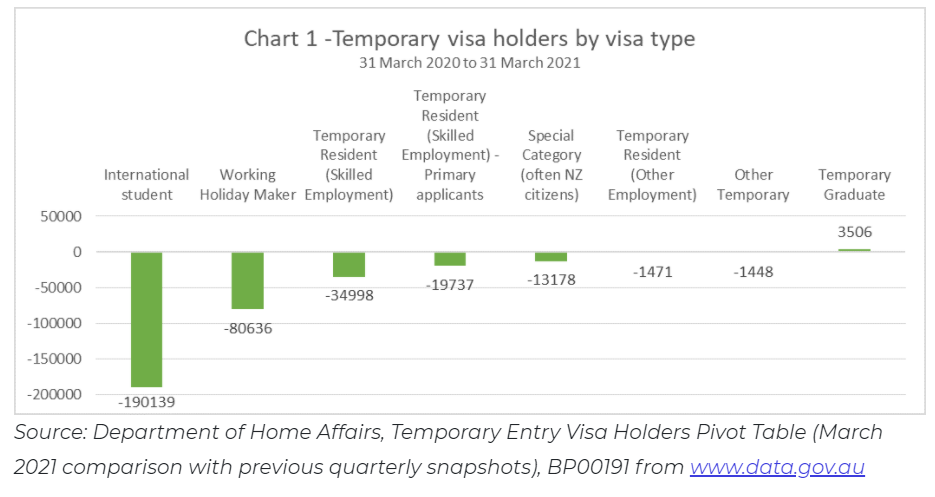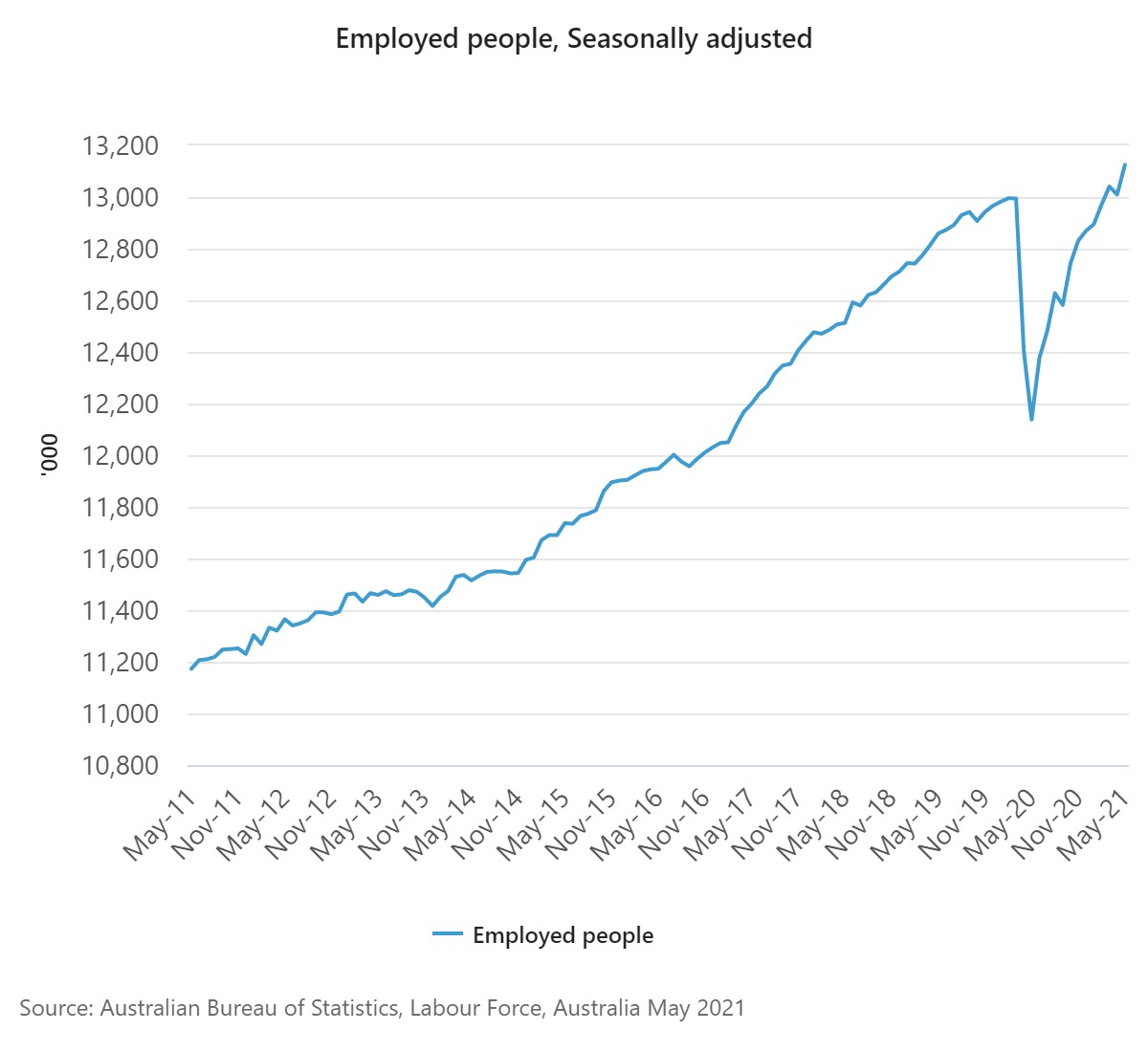Australian Candidate Market – Why has it Changed and What to do About it?
The impact this pandemic and our initial response has had on our economy is coming home to roost a year on. The most talked about thing in the business world is no longer how hard it is to find ‘good’ staff but how hard it is to find staff at all. And everyone’s asking the same question, “Why aren’t they out there?”, followed quickly by “How do we attract them?”.
Bernadette Eichner

Wind the clock back to July 2020
The world was in the grip of a serious global pandemic – no country was untouched. In Australia, the economy was emerging from a series of short lockdowns but in a relatively safe position due to international borders being slammed shut within a week or two of the WHO declaring the pandemic. Businesses were staying afloat thanks to a quick rescue package called JobKeeper and individuals who had lost their jobs were able to pay their rent thanks to the JobSeeker COVID Payment each fortnight.
All this feeling of economic safety saw property prices soar above previously unthought levels, personal savings increase and retail activity go through the roof. All markers of increased consumer confidence.
Regional areas were seeing more tourists than ever before with people forced to travel within their own country, creating numerous unprecedented business and job opportunities. And the number of jobs advertised across the nation continued to climb month on month to hit an all-time high, surpassing pre-pandemic levels in the cities and breaking records in the regions.
People felt pretty confident and comfortable that everything was going to turn out OK and that while not completely untouchable, Australia was in a better position than pretty much any other country.
But were we living in a fool’s paradise? Were we ignoring what was happening everywhere else around the world at our peril? Did we think we were somehow ‘protected’ in a way others weren’t?
The impact this pandemic and our initial response (albeit a good one) has had on our economy is coming home to roost a year on.
Fast forward to July 2021
The most talked about thing in the business world is no longer how hard it is to find ‘good’ staff but how hard it is to find staff at all. And everyone’s asking the same question, “Why aren’t they out there?”, followed quickly by “How do we attract them?”.
Let’s break those questions down.
Why aren’t they out there?
1. Closed borders mean less candidates.
We have virtually no holiday travellers or people on temporary skilled visas, immigration has been cut and stranded Aussies still can’t get home.
So many industries hadn’t realised how reliant they’d become on travellers or newly arrived residents with skill sets in demand in our economy here. Nor had we imagined the impact that Aussies not being able to get home would have on the job market.
In June 2019 it was estimated there were over 135,000 travellers on holiday working visas in Australia. By May 2020 that had dropped to below 80,000 with many taking the opportunity to be repatriated to their country of origin to see out the pandemic. At the end of March 2021, there were only 38,630 left in Australia.
Those figures do not take into account the other Visa holders we relied on – the number of Temporary Skilled Visa, Permanent Skilled Visa, Student Visa holders has plummeted.
This chart, published by the Department of Home Affairs, says it pretty clearly. In just 12 months, the number of work/skills related Visa holders in Australia has reduced by a whopping 340,000 people!

2. Candidates are ‘staying put’ and negotiating better deals
The candidate shortage has made employers even more acutely aware of the value of the people they already have, and candidates more aware of the value they represent.
People who have already proven they can still be effective working from home are negotiating great flexible employment arrangements without a loss of income, profit-share deals instead of salary increases and promotions rather than looking to move and start again somewhere else, where things may not be so flexible.
Employers are agreeing to these deals, rewarding loyalty and recognising the value of retaining key staff in the journey to full recovery.
3. The unemployed are now employed
Over the year to May 2021, employment in Australia increased by 8.1% or 987,200 people.
That’s almost a million people who are in jobs now that weren’t a year ago and represents an employment-to-population ratio of an incredible 62.8%.
The long-held and popular view that there are “heaps of jobs if people want them badly enough” doesn’t ring true. Blaming the still-unemployed for the candidate crisis we have is just plain wrong, and somewhat cruel.
When you consider how many of the population are outside working age or unable to work due to disability or caring responsibilities, you start to get a sense of why there aren’t too many ‘idle’ people out there looking for work.

How do we attract them? The WIFM principle.
Incentives are the big winner when it comes to attracting the people you want. As professional recruiters, the single biggest barrier we’re finding to candidates moving companies is incentives. The old WIFM (What’s in it for me?) principle is at an all-time high in a tight candidate market.
With the huge majority of skilled candidates already in jobs, your first challenge is to present a better opportunity than the one they already have. But that doesn’t always have to be a higher salary.
To find candidates you first need to understand what is important to them and then appeal to that in your advertising and job offers.
It is no longer a case of benevolent employers ‘giving people a chance’ and then expecting gratefulness and undying loyalty in return. The world has changed considerably. Flexible work arrangements are now the norm for many, and it’s not just the new generation that is looking for jobs and careers offering more than ‘just a job’.
Candidates will be attracted to companies who can provide a work experience that meets both their professional and personal aspirations.
1. Think outside the box and resist the “this is the way it’s always been done” mantra
Life is different. Things have changed. And that requires creative and flexible thinking. How can you do your business differently? Does every person need to be in the office every day to get the job done?
2. Offer flexible work arrangements
Obviously, there are many jobs that cannot be done remotely – industries like retail, hospitality, agriculture, fisheries, health care and so on require face to face interaction with customers or a physical labour component and are therefore unable to be done online or from a distance.
But if parts of your business can be effectively managed remotely, agree to flexible work arrangements for your new hire. The last year has proven that if you have a solid reporting structure and clear lines of accountability, efficiency doesn’t suffer when people are working from home.
3. Offer productivity bonuses or a profit-share instead of a higher salary
Competent people are often incentivised by a share of the value their contribution has made and motivated to be part of making something successful. Perhaps you can’t offer the salary incentives people are looking for to make the move. We get that. Budgets are tight. Cash flow is threatened. But perhaps you can look at the remuneration question differently. Bonuses or profit share linked to revenue improvement might be all you need to do.
4. Provide learning and development opportunities
One of the things we’ve noticed changing considerably over the years, is the number of candidates who are looking for a company that can provide them with professional and personal improvement opportunities as part of a balanced employment agreement.
Depending on what’s important to people, you may like to consider offering an L+D incentive – things like paid time off for exams if they’re studying, subsiding their study costs, sending them off to leadership programs, etc.
A crisis always presents us with opportunities – don’t waste them!
The past year has thrown up lots of challenges and for some, considerable hardship, us included. But it’s also given us lots of time to reflect – personally and professionally.
We’ve had a chance to stand back and have a look at our lives and businesses. We’ve had a chance to reframe our thinking about business processes and revenue streams. And we’ve learned that in times of crisis, creative and flexible thinking, streamlining processes and taking decisive action wins out over apathy, fear or indecision every time.
The way we approach the current candidate shortage is one of those times. Think outside the box, review processes, and employ creative and flexible thinking to attract the type of person you want.
Professional recruitment and fair pricing? Yes, it‘s possible!
At Just Right People Recruitment we‘ll give you the flexibility to choose between three different pricing models. And we guarantee each one will deliver a high-quality recruitment outcome tailored to your job, your budget and your specific needs. Now, that’s fair!
Learn more…Bernadette Eichner
Bernadette Eichner, Cofounder and CEO of Just Right People, is a recruitment industry entrepreneur and thought leader in Australia, totally committed to improving the recruiter experience for clients and candidates alike. Her secret to life is to “just do the next thing that needs to be done”.
Follow Bernadette

